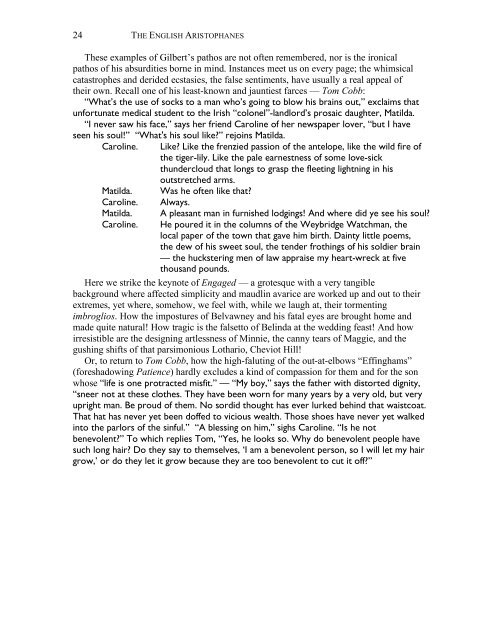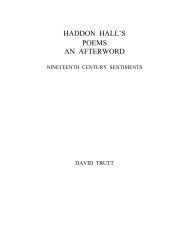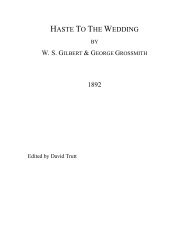WS Gilbert A Mid-Victorian Aristophanes - Haddon Hall
WS Gilbert A Mid-Victorian Aristophanes - Haddon Hall
WS Gilbert A Mid-Victorian Aristophanes - Haddon Hall
Create successful ePaper yourself
Turn your PDF publications into a flip-book with our unique Google optimized e-Paper software.
24 THE ENGLISH ARISTOPHANES<br />
These examples of <strong>Gilbert</strong>’s pathos are not often remembered, nor is the ironical<br />
pathos of his absurdities borne in mind. Instances meet us on every page; the whimsical<br />
catastrophes and derided ecstasies, the false sentiments, have usually a real appeal of<br />
their own. Recall one of his least-known and jauntiest farces — Tom Cobb:<br />
“What’s the use of socks to a man who’s going to blow his brains out,” exclaims that<br />
unfortunate medical student to the Irish “colonel”-landlord’s prosaic daughter, Matilda.<br />
“I never saw his face,” says her friend Caroline of her newspaper lover, “but I have<br />
seen his soul!” “What's his soul like?” rejoins Matilda.<br />
Caroline. Like? Like the frenzied passion of the antelope, like the wild fire of<br />
the tiger-lily. Like the pale earnestness of some love-sick<br />
thundercloud that longs to grasp the fleeting lightning in his<br />
outstretched arms.<br />
Matilda. Was he often like that?<br />
Caroline. Always.<br />
Matilda. A pleasant man in furnished lodgings! And where did ye see his soul?<br />
Caroline. He poured it in the columns of the Weybridge Watchman, the<br />
local paper of the town that gave him birth. Dainty little poems,<br />
the dew of his sweet soul, the tender frothings of his soldier brain<br />
— the huckstering men of law appraise my heart-wreck at five<br />
thousand pounds.<br />
Here we strike the keynote of Engaged — a grotesque with a very tangible<br />
background where affected simplicity and maudlin avarice are worked up and out to their<br />
extremes, yet where, somehow, we feel with, while we laugh at, their tormenting<br />
imbroglios. How the impostures of Belvawney and his fatal eyes are brought home and<br />
made quite natural! How tragic is the falsetto of Belinda at the wedding feast! And how<br />
irresistible are the designing artlessness of Minnie, the canny tears of Maggie, and the<br />
gushing shifts of that parsimonious Lothario, Cheviot Hill!<br />
Or, to return to Tom Cobb, how the high-faluting of the out-at-elbows “Effinghams”<br />
(foreshadowing Patience) hardly excludes a kind of compassion for them and for the son<br />
whose “life is one protracted misfit.” — “My boy,” says the father with distorted dignity,<br />
“sneer not at these clothes. They have been worn for many years by a very old, but very<br />
upright man. Be proud of them. No sordid thought has ever lurked behind that waistcoat.<br />
That hat has never yet been doffed to vicious wealth. Those shoes have never yet walked<br />
into the parlors of the sinful.” “A blessing on him,” sighs Caroline. “Is he not<br />
benevolent?” To which replies Tom, “Yes, he looks so. Why do benevolent people have<br />
such long hair? Do they say to themselves, ‘I am a benevolent person, so I will let my hair<br />
grow,’ or do they let it grow because they are too benevolent to cut it off?”







